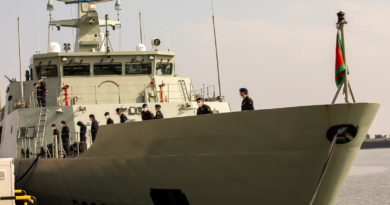Trafalgar's revenge
(B2) The Spanish Armada and the Royal will take control of Operation EUNAVFOR Atalanta. The decision was made discreetly at the end of July. To the great displeasure of London, which has become more European than Europeans...
A decision related to Brexit
This decision is not new to our readers (read: Atalanta HQ will be transferred from Northwood to Rota. Viva Spain). But it is no less important. This is the first major Brexit-related decision in terms of security and defence. It was indeed written as a watermark in the agreement on the withdrawal of the United Kingdom from the European Union (in article 124.7 of the agreement) which prevents the British from commanding a European operation and from hosting the HQ of such transaction after March 29, 2019 (expected Brexit date).
political importance
While maritime piracy has largely decreased, this transfer does not really have any fundamental consequence at the operational level. The London HQ has also at no time been undeserved. And the British really played the European game by providing the necessary, often high-quality manpower. At the symbolic and political level, however, the consequence is undoubtedly less visible but nevertheless essential. A real revenge of Trafalgar. The Spanish Armada and the French Royal thus take 200 years later, a (small) revenge. While the battle of October 21, 1805 had consecrated a certain British supremacy on the seas, this transfer could thus be a small drop in the loss of British influence at sea.
A Crack in London's Maritime Supremacy
This political consequence will not be immediate. It could be done rather in the medium and long term. It certainly does not call into question the supremacy of London as a maritime stronghold, with the presence of the main shipping companies, the international maritime office, etc. But it introduces a 'crack' in the device. It comes to accredit the idea that we can do without the British in maritime matters. Which is certainly more dangerous than the loss of a command. In this regard, the departure of the MSCHOA—the center that ensures the coordination between the military ships and the merchant ships—is just as important as the very loss of the headquarters.
The minority role
The main European maritime operation will no longer be commanded from London but from Spain. While the other maritime operation is already ordered from Rome. Only Northwood will have to command the operation. Sea Guardian in the Mediterranean which has only a limited role with intermittent operation (so far) and no executive mandate, unlike the other two European operations.
A small financial loss
Along the way, it deprives the British Navy of an operational flagship as well as a certain financial windfall. The British had managed to amortize part of the modernization of their HQ through European funds. They will no longer be able to benefit from this pooling. It will now be the Spaniards and French who will benefit.
An undeniable success
The time has passed. And maritime piracy no longer occupies the center of the news. Quite simply because the pressure has diminished. But let's remember. At the height of Somali piracy, in January 2011, there were 736 hostages and 32 ships held in Somalia. Seven years later... we are at zero. Since October 2016, exactly, there were no more hostages and ships detained.
What is the result of the operation
The operation had an undeniable success in protecting World Food Program ships, which was (it should be remembered) one of the first objectives of the operation. The success rate is 100%. It was necessary to protect the WFP ships that supplied Somalia and provided (and still provide) food and humanitarian aid to the Somali populations. It was also necessary to protect the ships which supplied the forces of AMISOM, the African Union operation in Somalia, an operation which is not just peacekeeping (static) but a combat and recovery operation by force from the ground on the Al Shabab.
... and in terms of prisoners
According to our own record (which differs slightly from the official record) the operation resulted in the apprehension of approximately 800 suspects. About 2/3 were disarmed and released immediately. A third of them were handed over to judicial authorities either in countries in the region (Kenya, Seychelles, Mauritius, Somalia), or in the countries of the vessel(s) concerned (EU: Spain, France , Germany, Netherlands, Belgium and outside the EU: India, Japan, USA). Convictions have been handed down in most cases. Only twenty were released. Six suspects are still in pre-trial detention.
(Nicolas Gros-Verheyde)
The British super champions... of Europe
The British government tried to resist this departure, offering to keep command of the operation or a foothold in its function. For those like B2 who followed the start of this operation, we can see a great turnaround... Ten years ago, in 2007-2008, British diplomats fought in the shadows to scuttle this operation, criticizing the merits, trying to delay its implementation, to reduce its field of investigation, and to set up a concurrent operation within NATO.
What a paradox!
Today, they have become one of its most fervent supporters. Hard to find more enthusiastic about the European Union's security and defense policy than the British. Operation Atalanta is one of the major successes of security and defense policy, we can hear. Better : " British leadership and command of the operation was instrumental in its success “, boasts British diplomacy.
(*) We take into account all arrests made by a vessel under European mandate even if the surrender takes place (for legal reasons) under the national flag. This is the case for the handovers to the Somalis (with whom no agreement had been made by the EU). The official toll is 166 suspects transferred resulting in 145 convictions.
